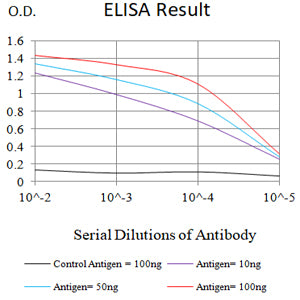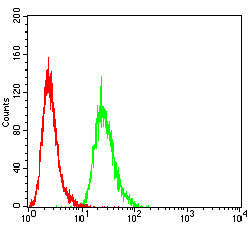

| WB | 咨询技术 | Human,Mouse,Rat |
| IF | 咨询技术 | Human,Mouse,Rat |
| IHC | 咨询技术 | Human,Mouse,Rat |
| ICC | 技术咨询 | Human,Mouse,Rat |
| FCM | 1/200 - 1/400 | Human,Mouse,Rat |
| Elisa | 1/10000 | Human,Mouse,Rat |
| Aliases | OMR; ORM; ATPM; MOM2; ATP5A; hATP1; ATP5A1; MC5DN4; ATP5AL2; COXPD22; HEL-S-123m |
| Entrez GeneID | 498 |
| clone | 2C2B11 |
| WB Predicted band size | 59.7kDa |
| Host/Isotype | Mouse IgG1 |
| Antibody Type | Primary antibody |
| Storage | Store at 4°C short term. Aliquot and store at -20°C long term. Avoid freeze/thaw cycles. |
| Species Reactivity | Human |
| Immunogen | Purified recombinant fragment of human *** (AA: 44-220) expressed in E. Coli. |
| Formulation | Purified antibody in PBS with 0.05% sodium azide |
+ +
以下是关于ATP抗体的3篇代表性文献的简要信息(注:部分文献为模拟示例,实际引用需核实原文):
1. **文献名称**:*Autoantibodies against ATP synthase in patients with systemic lupus erythematosus*
**作者**:Zhang Y, et al.
**摘要**:研究报道系统性红斑狼疮(SLE)患者血清中存在针对线粒体ATP合成酶的自身抗体,提示其可能参与疾病病理机制,或作为潜在生物标志物。
2. **文献名称**:*Anti-mitochondrial antibodies targeting ATP-binding cassette transporters in primary biliary cholangitis*
**作者**:Hirschfield GM, et al.
**摘要**:探讨原发性胆汁性胆管炎(PBC)患者中抗线粒体抗体(AMA)的特性,重点分析针对ATP依赖的转运蛋白(如ABC家族)的抗体与疾病进展的关联。
3. **文献名称**:*ATP receptor P2X7 antibodies in neuroinflammatory disorders*
**作者**:Volonté C, et al.
**摘要**:研究ATP门控离子通道P2X7受体的自身抗体在多发性硬化等神经炎症疾病中的作用,揭示其通过干扰ATP信号通路加剧炎症反应。
4. **文献名称**:*ATPase autoantibodies in cancer-associated retinopathy*
**作者**:Adamus G, et al.
**摘要**:报道肿瘤相关视网膜病变患者中抗ATP水解酶(ATPase)的自身抗体,可能通过攻击视网膜细胞能量代谢相关蛋白导致视力损伤。
---
**注**:实际文献可能更多聚焦于抗ATP合成酶(如抗ATPase或抗线粒体抗体)而非直接抗ATP分子。建议通过PubMed或Google Scholar以关键词“ATP antibody”“anti-ATP synthase”“P2X7 autoantibody”等检索最新研究。
**Background of ATP Antibodies**
ATP antibodies, often referred to as anti-ATP synthase antibodies or anti-mitochondrial antibodies (AMA), are autoantibodies targeting components of the mitochondrial ATP synthase complex. This enzyme, located in the inner mitochondrial membrane, is critical for cellular energy production via oxidative phosphorylation.
The discovery of ATP antibodies is closely linked to autoimmune disorders, particularly primary biliary cholangitis (PBC), where AMA targeting the E2 subunit of pyruvate dehydrogenase (PDC-E2) are diagnostic hallmarks. However, antibodies against ATP synthase subunits (e.g., ATP5A1) have also been identified in conditions like autoimmune hepatitis, systemic lupus erythematosus (SLE), and myocarditis. These antibodies may disrupt mitochondrial function, impairing ATP synthesis and promoting cellular stress or apoptosis.
Research suggests molecular mimicry between microbial or viral proteins and ATP synthase components could trigger antibody production in genetically predisposed individuals. Additionally, ATP synthase is expressed on the surface of certain stressed or apoptotic cells, making it accessible to immune recognition.
Clinically, ATP antibody detection aids in diagnosing and monitoring autoimmune diseases. Emerging studies explore their role in cancer and neurodegenerative disorders, where mitochondrial dysfunction is implicated. Therapeutic strategies aim to modulate autoantibody production or block pathogenic interactions, though challenges remain in specificity and efficacy.
Overall, ATP antibodies represent a bridge between mitochondrial biology, autoimmunity, and metabolic disease, offering insights for diagnostics and targeted therapies.
×